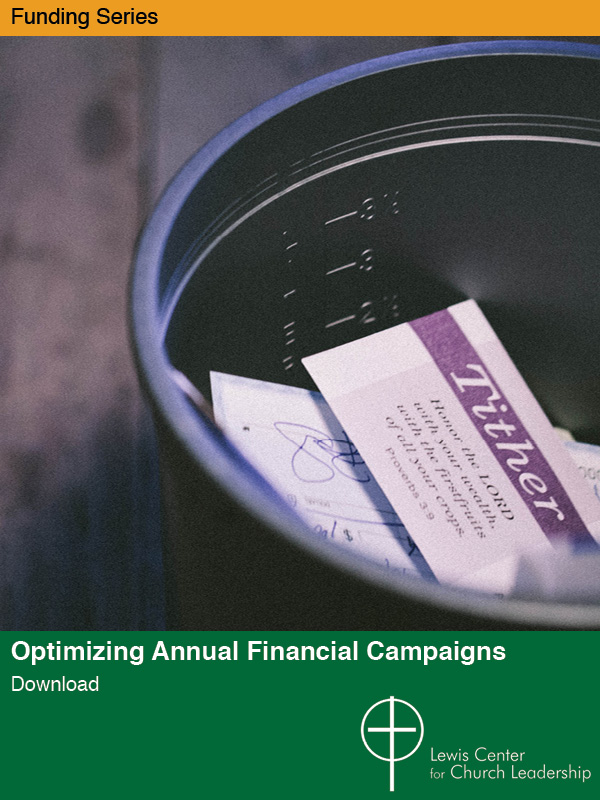One of the simple realities of congregational life is that most churches are financially dependent on voluntary giving. Most pastors do not relish the annual giving campaign. In our experience, many if not most pastors would avoid talking about giving altogether if they could. First, money-talk does not fit their vocational understanding. Second, there is the bad example of television evangelists who seem to (and do) constantly ask for money to continue their ministry. And some clergy fear rejection by congregation members. Money is a hot topic.
Are our fundraising practices are designed to preserve an institution or to embrace the cross of Jesus Christ? Do fundraising practices highlight the preservation of current structures, or do they lift up a vision of God’s present and future activity?
The key problem is that the fundraising practices of many churches are not commensurate with the character of God. Often theological concerns are completely abandoned in light of the need for raising money. Congregation members are thought of and treated one way throughout the year, but when it comes to annual fundraising, the focus shifts.
Focus on stewardship not donations. Are parishioners members of the body of Christ who give because of transformed relationships with God and their neighbors? Or are they donors who contribute their “fair share” to the upkeep and mission of the local church?
In theological terms, members of Christ’s body give out of gratitude and poverty in the light of God’s quantitatively and qualitatively different gift to them. The ongoing gracious self-giving of the triune God is the proper context for understanding human giving. On the other hand, stripped of that context, “donors” give out of their abundance and desire to help.
The additional problem with a donor approach is that donors maintain control while stewards do not. Implicit in the biblical understanding of stewardship is that this world and all in it is God’s creation, not ours. We have a very important place in the creation, a very high vocation within the created order, but we are not the owners of creation. We are not in final control of it.
The idea of donation places the key emphasis on the voluntary nature of the gift. Donors may give, but they need not. They give where they see fit to do so. They give as much as they like to whomever they like. But if the person or organization that receives the gift no longer seems worthy, the donor may always withhold the gift in the future. The necessary answer to donations is the teaching and practice of true Christian stewardship.
Focus on mission not organizational preservation. A second point of concern is whether our fundraising practices are designed to preserve an institution or to embrace the cross of Jesus Christ. There is another way to raise the question as to whether our churches are organization-focused or mission-focused. Do fundraising practices highlight the preservation of current structures, or do they lift up a vision of God’s present and future activity? An emphasis on scarcity is a sheer sign of organization-focused fund-raising.
Focus on gratitude not obligation. A third point of concern is whether appeals for money are thanksgiving-based, obligation-based, or guilt-based. We are concerned that too many Christians give out of a sense of obligation and some even out of a sense of guilt.
This again should help us see how important theology is in giving. If the primary concern is raising money, then the question of motivation is not fundamental. Obligation and guilt-based giving can be quite motivating, at least in the short term. How often have we heard appeals on behalf of what others have done and how it is now the current generation’s time to give? And worse, how often have we encountered Christians who give in order to fulfill some old debt? Or perhaps this is their way to atone for some hidden sin? Motivations do matter, because they reveal what we actually believe about God’s character. Is God the loving one who always gives beyond what people deserve? Or is God an all-powerful entity who is best appeased by gifts?
This article is adapted from Janet and Philip’s book, Ministry and Money: A Practical Guide for Pastors, Westminster John Knox Press, © 2009 Janet T. Jamieson and Philip D. Jamieson. Used by permission. Their book is available from the publisher as well as at Amazon.






